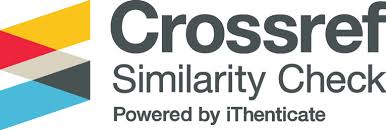Penurunan Semangat Kerja Akibat Meningkatnya Stres Kerja dan Konflik Kerja
Abstract
To be able to create morale, companies need to pay attention to the factors that can cause a decrease in morale. The purpose of this study was to determine the effect of work stress and work conflict on morale. This research was conducted at PT. BPR Urip Kalantas in Sempidi using a questionnaire measured using a Likert scale of five answer choices to as many as 45 respondents who were employees at the research location using census techniques. Respondents' answers are then used to test the validity and reliability, then proceed with the classical assumption test and multiple linear regression. The conclusion of this research is that the increase of each work stress and work conflict can result in a significant decrease in employee morale.
References
Agustina, A., & Sofian, E. (2019). “Pengaruh Konflik Dan Stres Kerja Terhadap Semangat Kerja Karyawan di PT. Dexa Medica Cabang Medan.†Jurnal Bisnis Corporate, 4(1), 64–76.
Alwi, M. (2016). “Pengaruh Semangat Kerja Pegawai Terhadap Kefektifan Organisasi Unit Program Belajar Jarak Jauh Universitas Terbuka Makasar.†Jurnal Analisis Pelayanan Publik, 2(1).
Amiruddin, A., Pagalung, G., Kartini, K., & Arifuddin, A. (2019). "The Effects Of Time Pressure, Work-Family Conflict And Role Ambiguity On Work Stress And Its Effect On Audit Quality Reduction Behavior ". International Journal of Law and Management, 61(2), 434–454.
Chen, X., Liu, J., Yuan, Y., & Cui, X. (2019). “The curvilinear effect of task conflict on idea generation: The mediating role of reflexivity and the moderating role of task complexity.†International Journal of Conflict Management, 30(2), 158–179.
Chen, Z., Zhang, X., & Vogel, D. (2011). “Exploring the underlying processes between conflict and knowledge sharing: a work-engagement perspectiveâ€,. Journal of Applied Social Psychology, 41(5), 1005–1033.
Contreras, S., & Gonzalez, J. A. (2020). Organizational change and work stress, attitudes, and cognitive load utilization: a natural experiment in a university restructuring. Personnel Review, 50(1), 264–284. https://doi.org/10.1108/PR-06-2018-0231
de Wit, F., Greer, L. L., & Jehn, K. (2012). “The Paradox of Intragroup Conflict: A Meta-Analysis.†Journal of Applied Psychology, 97(2), 360–390.
Enshassi, A., El-Rayyes, Y., & Alkilani, S. (2008). “Job Stress, Job Burnout and Safety Performance in the Palestinian Construction Industry.†Journal of Financial Management of Property and Construction, 20(2), 170–187. https://doi.org/10.1108/jfmpc.2008.37613aaa.002
Fahmi, S. (2016). “Pengaruh Stres Kerja dan Konflik Kerja Terhadap Semangat Kerja Pada PT. Omega Mas Pasuruan.†Jurnal Ekonomi Modernisasi, 12(3), 107–116.
Hasibuan, M. S. . (2010). “Manajemen Sumber Daya Manusia.†Jakarta: Bumi Aksara.
Hidayat, A., Pramadewi, A., & Rifki, A. (2019). “Pengaruh stres kerja dan konflik kerja terhadap semangat kerja karyawan pabrik.†SOROT: Jurnal Ilmu-Ilmu Sosial, 14(2), 21–29.
Kao, F. H., & Cheng, B. S. (2014). “Job stress in workplace: review and extension.†Journal of Human Resource Management, 14(1), 77–102.
Manihuruk, C. P., & Tirtayasa, S. (2020). “Pengaruh Stres Kerja, Motivasi Kerja dan Lingkungan Kerja Terhadap Semangat Kerja Pegawai.†MANEGGGIO: Jurnal Ilmiah Magister Manajemen, 3(2), 296–307.
Nitisemito, A. . (2006). “Manajemen Personalia.†Edisi Kedua. Jakarta: Ghalia Indonesia.
Rasdam, R., Alam, S., & Reni, A. (2018). “Analisis Pengaruh Lingkungan Kerja, Kompensasi, Stres Kerja Terhadap Semangat Kerja dan Dampaknya Terhadap Kinerja Karyawan.†Hasanuddin Journal of Applied Business and Entrepreneurship, 1(4), 96–106.
Tohardi, T. (2006). “Pemahaman Praktis Manajemen Sumber Daya Manusia.†Bandung: Mandar Maju.
Tyagi, A., & Dhar, R. L. (2014). Factors affecting health of the police officials: Mediating role of job stress. Policing: An International Journal of Police Strategies & Management, 37(3), 649–664. https://doi.org/10.1108/PIJPSM-12-2013-0128
Widiato, T., Jamaludin, A., & Feri, F. (2016). “Pengaruh Konflik Kerja Terhadap Semangat Kerja Karyawan di PT. Paramitha Bangun Sarana.†Journal of Applied Business and Economics, 2(4), 300–307.
Yang, F. C., Kao, R. H., & Cho, C. C. (2019). A multilevel study on the causal relationship in association network of work stress: Moderating effects of social support. Policing: An International Journal, 42(4), 624–639. https://doi.org/10.1108/PIJPSM-07-2018-0086
Yao, Y.-H., Fan, Y.-Y., Guo, Y.-X., & Li, Y. (2014). “Leadership, work stress and employee behavior.†Chinese Management Studies, 8(1), 109–126. http://dx.doi.org/10.1108/S1871-3173(2013)0000007004
Ye, Z., Liu, H., & Gu, J. (2019). Relationships between conflicts and employee perceived job performance: Job satisfaction as mediator and collectivism as moderator. International Journal of Conflict Management, 30(5), 706–728. https://doi.org/10.1108/IJCMA-01-2019-0010
Yofandi, A. (2017). “Pengaruh Konflik Kerja, Stres Kerja, dan Semangat Kerja Terhadap Kinerja Karyawan Pada PT. Perkebunan Nusantara V (Persero) Pekanbaru.†Jom FEKON, 4(1), 1015–1029.








